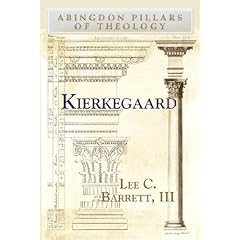My Professor of Theology, Lee Barrett, wrote a book about Kierkegaard that is really good! Here's a review I wrote for class.
“To want to study Kierkegaard,” said Lee Barrett. “is really odd. He didn’t travel all that much, staying in and around Copenhagen, never really even making it to the Danish mainland save for two or three travels to Berlin. He wasn’t popular in his lifetime. He is not an easy read as he starts a story, interrupts it with a short unrelated novelette, and then keeps going. He does not stick to one genre, instead using many different types sometimes within the same story. He didn’t really do anything except write has he never had a job. He didn’t marry and although he fell deeply in love with a woman and told her that he couldn’t marry her because she would make him too happy, which he tried to explain to her. He’s simultaneously orthodox Lutheran yet a strong critic of the state Lutheran church. He is so difficult to figure out that his name is used as a synonym for obscure, mystifying reflections.”
This seems like an odd thing for someone to say after writing a book about Kierkegaard.
I recently attended a book signing and conversation with Lee Barrett in celebration of his new book, Kierkegaard. An Abingdom Pillars of Theology Book. Barrett explains that the reason to study Kierkegaard is that he is sort of like a Christian Socrates. He perseveres in destabilizing our comfortable lives, exposing the shallowness of our piety and unmasking our self-deceptions. He makes our life more difficult but also more honest and responsible. He may even get a few of his readers to be more faithful and loving, which Barrett states is what the entire corpus of Kierkegaard’s writing is meant to do.
Barrett found Kierkegaard while in undergrad which should not be surprising as after World War II the US had discovered Kierkegaard and had embraced him; as evidenced by the beat generation. Since then, Barrett has lived through 2 announcements that the “Kierkegaard Craze” was over and dead, yet Soren keeps popping up. “There is a fascination with Kierkegaard because we can’t figure him out. He has been claimed by the deconstructionists, Neo-Orthodoxy, existentialists, and post-modernists.” Barrett stated. Yet Barrett doesn’t seek to categorize Kierkegaard in any of these movements in his book. His book’s purpose is to coach people on how to make sense of Kierkegaard and invite the reader to read Kierkegaard’s work for themselves. “I can’t sneeze for you, I can’t blink for you, nor will I read Kierkegaard for you. All I want to do is coach you on how to read Kierkegaard for theological insight.” Barrett stated.
What Barrett finds in Kierkegaard is a theology full of paradox and tension. Christianity as interpreted by Kierkegaard is simultaneously attractive and repulsive. At the core of Kierkegaard’s thought is an emphasis on radical, self-sacrificial love. This is love without boundaries and such a completely love of other than it’s a self-forgetting love. This is a love that will get you killed and it is what Jesus calls us into. “Picking up the cross isn’t going to be fun.” Barrett said. The criticism of the church of Kierkegaard’s time is that they equated this radical love into just being a good citizen and paying your taxes. The church dumbed it down and made it more palpable to the masses just as many in the faith do today. Faith always has an element of doubt for Kierkegaard that he found lacking in the state church. “Do we really want to love our neighbor as ourselves? Not really. And definitely not our enemies. In fact we’d rather draw lines between us in the church and them out there and fight over things,” Barrett stated. “Yet that’s what we’re called to do.” This should produce some guilt, some fear, some emotion into our piety and awaken the sleeper; which is what all of Kierkegaard’s shifty writing and genre changes sought to do to his readers.
Kierkegaard also critiqued the rise of mass transit and modern thought. He feared that soon popular opinion would determine matters of religious truth. The yearning to be contemporary and fit in is actually an evasion of responsible existence and a capitulation to cultural necessity. Modern people do not really choose anything for themselves; they take no risks, and therefore have no deep passions. This undermines the individual’s struggle to determine what is good, true, and beautiful, and eradicates the moral tension from human life and therefore erodes the pathos that Christianity requires.
It is no secret that I like both Lee Barrett and Kierkegaard. I really enjoyed listening to Barrett talk about Kierkegaard and then Chuck Melchert talking about how Barrett talks about Kierkegaard. It was a great learning experience all around. I learned that I too find Christianity repulsive and attractive at the same time. I have been taught that good pastors have strong boundaries yet wrestle with the Gospel and Jesus’ example. I find many streams of Christianity almost devoid of self-critique and largely impotent in its ability to challenge and confront the larger culture. It seems that the mainline denominations often sell out to intellectualism and forget the passionate part and the conservative churches do the opposite. A balance needs to be struck to bridge the space between head and heart. While doing so, the church can’t sell out for cultural values or a certain brand of political power. We are challenged to live in the tension.

1 comment:
I will have to pick this book up! Thanks for the review. I had to read "Either/Or" in college for my lit. class. I did not understand it then, but maybe with some help I will be able to figure it out. Any hints as to what that book was about?
Post a Comment